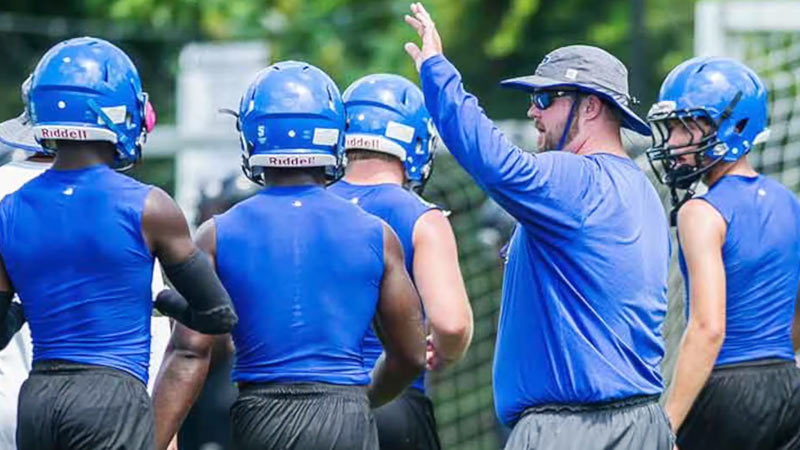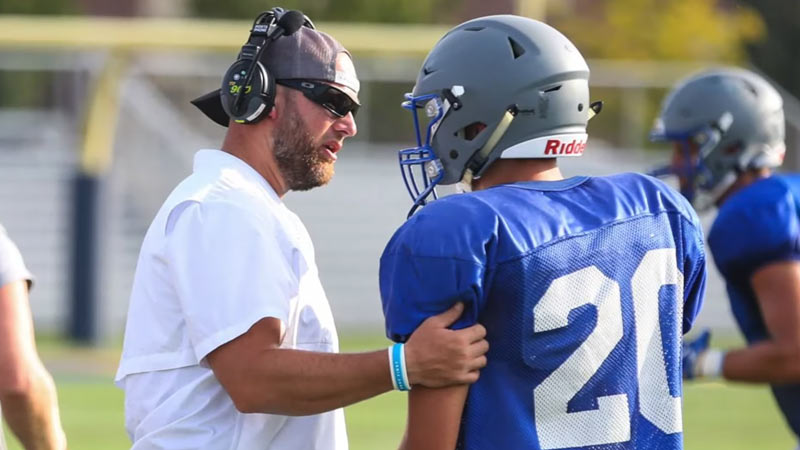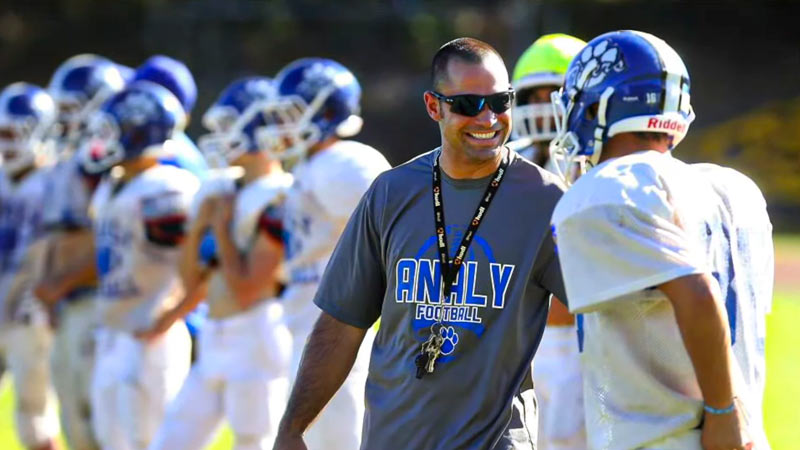In the dynamic world of American football, every victory, every touchdown, and every game-changing play is the result of meticulous planning, strategic execution, and unwavering dedication.
While the head coach is often the face of the team, there’s a critical force working behind the scenes – the Football Assistant Coach. These unsung heroes play a multifaceted role in shaping a team’s success, from honing players’ skills to formulating intricate game plans.
In this blog post, we delve into the world of Football Assistant Coaches, answering five frequently asked questions that shed light on their responsibilities, significance, and the impact they have on the gridiron. So, stay focused.
Who Can Be A Football Assistant Coach?
An American Football Assistant Coach plays a vital role in supporting the head coach and contributing to the success of the team. Typically, anyone with a deep understanding of the game, relevant experience, and strong communication skills can become an assistant coach.
This can include former players, individuals with coaching backgrounds, or those with a keen tactical understanding of football.
Assistant coaches are responsible for various tasks such as analyzing game strategies, developing players’ skills, assisting with practice sessions, and providing valuable insights during games.
They collaborate closely with the head coach to execute game plans effectively. While a college degree in sports science, physical education, or a related field can be advantageous, practical experience, dedication, and a strong work ethic are equally important.
Assistant coaches contribute to the overall coaching staff, shaping the team’s performance and contributing to the growth of players both on and off the field.
Qualification of a Football Assistant Coach

Qualifications for an American Football Assistant Coach can vary, but generally, the following attributes are essential:
Knowledge of the Game
A deep understanding of American football’s rules, strategies, and tactics is crucial. Assistant coaches should be able to analyze plays, create effective game plans, and provide strategic insights during games.
Coaching Experience
Prior coaching experience, whether at the high school, college, or lower levels, is beneficial. This experience demonstrates the ability to work with players, develop their skills, and effectively communicate coaching instructions.
Communication Skills
Assistant coaches must convey complex concepts clearly to players and other coaching staff. Effective communication fosters a positive learning environment and helps players execute strategies on the field.
Leadership Abilities
Assistant coaches should exhibit leadership qualities, motivating players and setting a positive example. They contribute to team cohesion and player development.
Adaptability
Football is constantly evolving, with new strategies and techniques emerging. Assistant coaches must be adaptable, willing to learn, and open to incorporating innovative ideas into their coaching approach.
Networking
Building a network within the football community can provide valuable opportunities for career growth. Connections with other coaches, scouts, and professionals can lead to new coaching roles.
Education
While a formal degree in sports science, physical education, or a related field can be advantageous, it’s not always a strict requirement. However, having a relevant degree can provide a deeper understanding of sports physiology, psychology, and coaching techniques.
Certifications
Some coaching certifications, like those offered by organizations such as USA Football or the National Federation of State High School Associations (NFHS), can enhance a coach’s credibility and knowledge.
Analytical Skills
Assistant coaches need to analyze game footage, assess player performance, and identify areas for improvement. Strong analytical skills aid in making informed coaching decisions.
Commitment and Passion
Coaching requires dedication and a genuine passion for the game. Assistant coaches must be willing to put in long hours, travel, and consistently work to help players reach their potential.
Roles and Responsibilities of a Football Assistant Coach

An American Football Assistant Coach plays a crucial role in supporting the head coach and contributing to the overall success of the team.
Their responsibilities encompass various aspects of coaching, player development, and team management. Here are some key roles and responsibilities of a football assistant coach:
Strategy and Game Planning
Collaborate with the head coach and other assistants to develop game plans, analyze opponents’ strengths and weaknesses, and strategize for upcoming games. Assist in creating offensive and defensive schemes to exploit the competition.
Player Development
Work closely with players to enhance their individual skills, understanding of positions, and overall performance. Provide personalized coaching and feedback to help players reach their potential.
Practice Sessions
Assist in planning and conducting effective practice sessions. Lead position-specific drills, offer guidance on techniques, and help simulate game scenarios to improve player readiness.
Film Analysis
Analyze game footage to evaluate team and player performance. Identify areas for improvement, study opponents’ tendencies, and provide insights that inform coaching decisions.
In-Game Support
During games, provide real-time input to the head coach and players. Offer strategic suggestions, adjustments, and feedback based on the unfolding game situation.
Scouting and Recruitment
Contribute to scouting efforts by evaluating potential recruits and identifying talent that aligns with the team’s needs. Attend high school games, showcases, and events to assess prospective players.
Player Motivation
Help maintain a positive and competitive team environment. Encourage players, boost morale, and inspire them to perform at their best.
Positional Coaching
Specialize in coaching specific positions, such as quarterbacks, linebackers, or offensive linemen. Provide focused instruction, techniques, and strategies tailored to each position’s requirements.
Game and Playbook Preparation
Assist in developing and refining the team’s playbook. Teach players their assignments within various offensive and defensive plays.
Strength and Conditioning
Collaborate with strength and conditioning staff to ensure players are physically prepared for the demands of the game. Recommend exercises and routines that complement football skills.
Leadership and Role Modeling
Serve as a role model for players in terms of sportsmanship, work ethic, and discipline. Demonstrate leadership qualities that contribute to team cohesion.
Communication
Foster effective communication within the coaching staff and between coaches and players. Convey instructions, expectations, and feedback to facilitate player growth.
Player Evaluation
Assess player performance regularly and provide constructive feedback. Help identify areas for improvement and design individualized development plans.
Crisis Management
Assist in handling difficult situations that may arise during games or within the team. Maintain composure and contribute to problem-solving efforts.
Continuous Learning
Stay updated on the latest trends, strategies, and developments in football coaching. Attend clinics, workshops, and conferences to enhance coaching knowledge.
An effective assistant coach plays an integral role in the success of a football team by contributing expertise, guidance, and support to both players and the coaching staff.
Salary Range of a Football Assistant Coach

The salary range of a Football Assistant Coach can vary widely depending on several factors, including the level of play (high school, college, or professional), the program’s budget, the coach’s experience, the geographical location, and the specific responsibilities assigned.
Here’s a general overview of the salary ranges for football assistant coaches across different levels:
High School Level
Assistant coaches at the high school level might earn an annual salary in the range of $1,000 to $10,000, with significant variations depending on the school’s resources, region, and level of competition.
College Level (Non-Power 5 Conferences)
At smaller college programs (outside of the Power 5 conferences), assistant coaches can earn salaries ranging from $30,000 to $80,000 per year.
College Level (Power 5 Conferences)
In major college football programs within Power 5 conferences, assistant coaches’ salaries can vary significantly. Salaries can start around $100,000 and go up to several hundred thousand dollars or even more for highly experienced or specialized coaches.
Professional Level (NFL)
Assistant coaches in the NFL earn considerably higher salaries. Entry-level assistant coaches might earn around $200,000 to $400,000 per year, while experienced coordinators can earn salaries well into the six figures or more.
Specialized Positions
Certain positions, such as offensive or defensive coordinators, carry more responsibility and often come with higher salaries. Salaries for these roles can vary widely, ranging from $100,000 to over a million dollars for highly successful and sought-after coordinators.
It’s important to note that these salary ranges are approximate and can change based on market demand, team performance, and other external factors.
Additionally, assistant coaches might receive benefits such as healthcare, retirement contributions, and bonuses based on team performance.
Significances of a Football Assistant Coach
Football Assistant Coaches play a pivotal role in the success of a football team, contributing in various significant ways:
Expertise and Strategy
Assistant coaches bring specialized knowledge to their assigned areas, such as offense, defense, or specific positions. They collaborate with the head coach to formulate strategic game plans, exploiting opponents’ weaknesses and maximizing team strengths.
Player Development
Assistant coaches focus on refining players’ skills, techniques, and understanding of their positions. This hands-on guidance helps players improve their performance, contributing to the overall team’s success.
Individualized Coaching
Assistant coaches provide personalized attention to players, tailoring instruction to their unique needs and abilities. This approach accelerates player growth and fosters a sense of trust and respect.
Game Management
During games, assistant coaches offer real-time analysis and adjustments to adapt to changing situations. Their insights play a crucial role in making tactical decisions that can directly impact the game’s outcome.
Practice Execution
Assistant coaches assist in planning and conducting practice sessions that simulate game scenarios. They design drills that improve players’ skills, teamwork, and preparedness for actual matches.
Positional Expertise
Specialized assistant coaches focus on specific positions, honing players’ skills in their designated roles. This targeted coaching enhances individual and team performance.
Motivation and Leadership
Assistant coaches inspire players through their dedication, knowledge, and passion for the sport. They contribute to a positive team culture, fostering camaraderie and high levels of motivation.
Scouting and Analysis
Assistant coaches analyze opponents’ play styles and strategies, providing valuable insights to the coaching staff. This analysis aids in formulating effective game plans and anticipating opponents’ moves.
Player-Coach Relationships
Assistant coaches often develop strong bonds with players, serving as mentors and role models. These relationships extend beyond the field, impacting players’ personal growth and character development.
Adaptability
Assistant coaches assist in adapting strategies based on changing circumstances, including injuries, weather conditions, and opponent adjustments. Their flexibility contributes to the team’s resilience.
FAQs
What exactly does a Football Assistant Coach do?
Assistant coaches in football take on a range of responsibilities, including developing players’ skills, strategizing game plans, leading drills, analyzing opponents, and providing real-time insights during games.
They specialize in specific positions or aspects of the game, contributing to the team’s cohesive strategy and performance.
How do Assistant Coaches contribute to player development?
Assistant coaches are instrumental in refining players’ techniques, positioning, and understanding of their roles. Through tailored coaching and one-on-one guidance, they foster individual growth, leading to a stronger, more versatile team.
What sets apart a successful Assistant Coach?
Effective communication, adaptability, strategic thinking, and leadership skills are qualities that define a successful assistant coach. A deep understanding of the game, coupled with a passion for nurturing talent, contributes to their impact on both players and the coaching staff.
How do Assistant Coaches aid in game-time decision-making?
During games, assistant coaches provide crucial real-time analysis to the head coach. Their insights help make rapid adjustments, capitalize on opponents’ weaknesses, and seize opportunities as they arise, influencing the game’s outcome.
What role do Assistant Coaches play in team dynamics?
Assistant coaches contribute significantly to fostering a positive team culture. Their mentorship, motivation, and guidance shape not only players’ on-field abilities but also their character, discipline, and camaraderie.
Wrapping Up
Football Assistant Coaches are the unsung architects of victory, working tirelessly behind the scenes to mold players into formidable athletes and teams into championship contenders.
Their expertise, dedication, and influence extend far beyond the sidelines, contributing to the sport’s rich legacy and the growth of athletes both on and off the field.
As we’ve uncovered the depths of their roles, it’s evident that Football Assistant Coaches are the driving force that propels the game forward, illuminating the path to glory for every touchdown scored and every victory celebrated. Best wishes.







